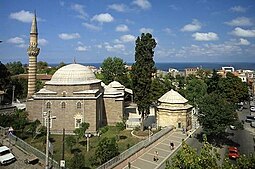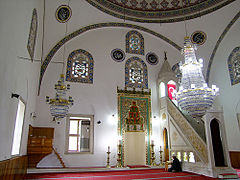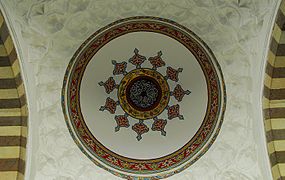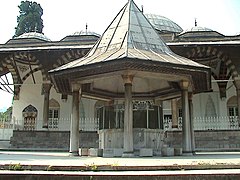| Revision as of 15:08, 28 November 2015 editIlxxczs (talk | contribs)3 edits vandalism, maybe the next time you'll be blocked← Previous edit | Revision as of 15:10, 28 November 2015 edit undoIlxxczs (talk | contribs)3 editsNo edit summaryNext edit → | ||
| Line 29: | Line 29: | ||
| There have been two theories: | There have been two theories: | ||
| * According to the first theory, she was the daughter of an ] |
* According to the first theory, she was the daughter of an ] converted to Islam.<ref>http://books.google.al/books?id=Cy0OAQAAMAAJ</ref> The Ottoman inscription (vakfiye) describes her as ''Hātun binti Abd-us-Samed (Daughter of Abd-us-Samed),'' Abdu's-Samad<ref name="Gül-Bahar"/> which proves her father was an Albanian who had "turned Turk", that is converted to Islam and joined the Turkish ]. ''Abd-us-Samed,'' Abdu's-Samad<ref name="Gül-Bahar"/> meaning ''Servant of God'', was the ] that was applied to many Balkan and Anatolian Christians who converted to Islam in the classical Ottoman period.<ref name="Gül-Bahar"/><ref>{{cite web|url=http://www.enfal.de/otarih44.htm|title=Consorts Of Ottoman Sultans (in Turkish)|publisher = Ottoman Web Page}}</ref><ref>{{cite book|author=Anthony Dolphin Alerson|title=The Structure of the Ottoman Dynasty|url=http://books.google.com/books?u75BAAAAYAAJ|year=1956|publisher=Clarendon Press}}</ref> She was the eighth wife of ] ] and died in 1510. | ||
| * According to the second theory she was the daughter of '']'', the eleventh ruler of the ] centered around ] in '']''. Her real name was ''Ayşe'' and was renamed ''Gül-Bahar'' after her marriage.<ref>{{cite web|url=http://www.kultur.gov.tr/EN/belge/2-1280/yavuz-sultan-selim-han.html|title=Yavuz Sultan Selim Han|accessdate=2009-02-06| | * According to the second theory she was the daughter of '']'', the eleventh ruler of the ] centered around ] in '']''. Her real name was ''Ayşe'' and was renamed ''Gül-Bahar'' after her marriage.<ref>{{cite web|url=http://www.kultur.gov.tr/EN/belge/2-1280/yavuz-sultan-selim-han.html|title=Yavuz Sultan Selim Han|accessdate=2009-02-06| | ||
| publisher=]}}</ref><ref>{{cite web|url= | publisher=]}}</ref><ref>{{cite web|url= | ||
Revision as of 15:10, 28 November 2015
For other uses, see Gülbahar. Not to be confused with Emine Gülbahar Hatun or Ayşe Hatun.| Gülbahar (Kül-Bahār) Hatun گل بهار خاتون | |
|---|---|
 The tomb of "Gülbahar Hatun" is located inside "Gülbahar Hatun Mosque" in Trabzon The tomb of "Gülbahar Hatun" is located inside "Gülbahar Hatun Mosque" in Trabzon | |
| Born | ? c. (?) Trabzon |
| Died | 19 November 1505 or 1510. Trabzon, Ottoman Empire |
| Resting place | Gülbahar Hatun Camii, Trabzon |
| Known for | Mother of Ottoman Sultan Selim I |
| Spouse | Bayezid II |
| Children | Selim I |
| Parent | The daughter of Abdu's-Samad |
Gülbahar Hatun (Template:Lang-ota; c. ? – 19 November 1505), was the eighth wife of Sultan Bayezid II and the mother of Sultan Selim I of the Ottoman Empire.
Origins
There have been two theories:
- According to the first theory, she was the daughter of an Albanian converted to Islam. The Ottoman inscription (vakfiye) describes her as Hātun binti Abd-us-Samed (Daughter of Abd-us-Samed), Abdu's-Samad which proves her father was an Albanian who had "turned Turk", that is converted to Islam and joined the Turkish Millet. Abd-us-Samed, Abdu's-Samad meaning Servant of God, was the anonym that was applied to many Balkan and Anatolian Christians who converted to Islam in the classical Ottoman period. She was the eighth wife of Ottoman Sultan Bayezid II and died in 1510.
- According to the second theory she was the daughter of Alaüddevle Bozkurt Bey, the eleventh ruler of the Dulkadirids centered around Elbistan in Kahramanmaraş. Her real name was Ayşe and was renamed Gül-Bahar after her marriage. She was the fourth wife of Ottoman Sultan Bayezid II and died in 1505.
The two theories have been a matter of debate between historians. The second theory is rejected and now there is consensus between scholars she was of Albanian origin.
Life
Bayezid married her in 1469 at Amasya. When Bayezid was still a şehzade ("Ottoman prince") and the governor of Amasya sanjak when she gave birth to Selim I in 1470. When Mehmed the Conqueror died in 1481, Bayezid moved to Constantinople, the capital of the Ottoman Empire, along with his family to ascend the throne.
According to Turkish tradition, all princes were expected to work as provincial governors (Sanjak-bey) as a part of their training. Mothers of princes were responsible for the proper behaviour of their sons in their provincial posts. In 1495 was sent to Trabzon sanjak and Gülbahar accompanied him.
However, she herself never became recognized as a Valide Sultan because she died on 19 November 1505 before Selim's accession to the sultanate.
Her tomb at the Gülbahar-Ayşe Hatun Mosque
Her tomb is located in Gülbahar Hatun Camii in Trabzon, Turkey. It was built in 1514 in honour of his mother and was restored in 1885.
-
 Interior view of Gülbahar Hatun Mosque located in Trabzon, Turkey.
Interior view of Gülbahar Hatun Mosque located in Trabzon, Turkey.
-
 Entrance.
Entrance.
-
 The dome.
The dome.
-
 Courtyard.
Courtyard.
-
 Wudu (ablution) area.
Wudu (ablution) area.
See also
- Ottoman family tree
- Line of succession to the Ottoman throne
- Ottoman Emperors family tree (simplified)
References
- ^ The Imperial House of Osman 4
- Yavuz Bahadıroğlu, Resimli Osmanlı Tarihi, Nesil Yayınları (Ottoman History with Illustrations, Nesil Publications), 15th Ed., 2009, page 157, ISBN 978-975-269-299-2
- Talha Uğurluel, Dünyaya Hükmeden Sultan Kanuni, Timaş Yayınları, 2. Printing, page 34, 2013, ISBN 978-605-08-0852-0
- http://books.google.al/books?id=Cy0OAQAAMAAJ
- "Consorts Of Ottoman Sultans (in Turkish)". Ottoman Web Page.
- Anthony Dolphin Alerson (1956). The Structure of the Ottoman Dynasty. Clarendon Press.
- "Yavuz Sultan Selim Han". Republic of Turkey Ministry of Culture and Tourism. Retrieved 2009-02-06.
- "Mother Of Yavuz Sultan Selim". Osmanlı Araştırmaları Vakfı (Ottoman Research Foundation).
{{cite web}}: Italic or bold markup not allowed in:|publisher=(help) - ^ Leslie P. Peirce (1993). The Imperial Harem: Women and Sovereignty in the Ottoman Empire. Oxford University Press. pp. 106–107. ISBN 978-0-195-08677-5.
- Dijkema, F.TH (1977), The Ottoman Historical Monumental Inscriptions in Edirne, BRILL, p. 32, ISBN 9004050620
- Bozbora, Nuray (1997), Osmanlı yönetiminde Arnavutluk ve Arnavut ulusçuluğu'nun gelişimi, p. 60
- Mausoleum of Gülbahar Hatun (Ayşe Hatun)
- Description about Gülbahar Hatun (Ayşe Hatun) Mosque